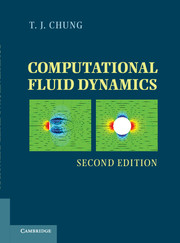Book contents
- Frontmatter
- Contents
- Preface to the First Edition
- Preface to the Revised Second Edition
- Part One Preliminaries
- Chapter One Introduction
- Chapter Two Governing Equations
- Part Two Finite Difference Methods
- Part Three Finite Element Methods
- Part Four Automatic Grid Generation, Adaptive Methods, and Computing Techniques
- Part Five Applications
- Appendixes
- Index
- References
Chapter One - Introduction
from Part One - Preliminaries
Published online by Cambridge University Press: 05 June 2012
- Frontmatter
- Contents
- Preface to the First Edition
- Preface to the Revised Second Edition
- Part One Preliminaries
- Chapter One Introduction
- Chapter Two Governing Equations
- Part Two Finite Difference Methods
- Part Three Finite Element Methods
- Part Four Automatic Grid Generation, Adaptive Methods, and Computing Techniques
- Part Five Applications
- Appendixes
- Index
- References
Summary
Historical Background
The development of modern computational fluid dynamics (CFD) began with the advent of the digital computer in the early 1950s. Finite difference methods (FDM) and finite element methods (FEM), which are the basic tools used in the solution of partial differential equations in general and CFD in particular, have different origins. In 1910, at the Royal Society of London, Richardson presented a paper on the first FDM solution for the stress analysis of a masonry dam. In contrast, the first FEM work was published in the Aeronautical Science Journal by Turner, Clough, Martin, and Topp for applications to aircraft stress analysis in 1956. Since then, both methods have been developed extensively in fluid dynamics, heat transfer, and related areas.
Earlier applications of FDM in CFD include Courant, Friedrichs, and Lewy [1928], Evans and Harlow [1957], Godunov [1959], Lax and Wendroff [1960], MacCormack [1969], Briley and McDonald [1973], van Leer [1974], Beam and Warming [1978], Harten [1978, 1983], Roe [1981, 1984], Jameson [1982], among many others. The literature on FDM in CFD is adequately documented in many text books such as Roache [1972, 1999], Patankar [1980], Peyret and Taylor [1983], Anderson, Tannehill, and Pletcher [1984, 1997], Hoffman [1989], Hirsch [1988, 1990], Fletcher [1988], Anderson [1995], and Ferziger and Peric [1999], among others.
Information
- Type
- Chapter
- Information
- Computational Fluid Dynamics , pp. 3 - 28Publisher: Cambridge University PressPrint publication year: 2010
